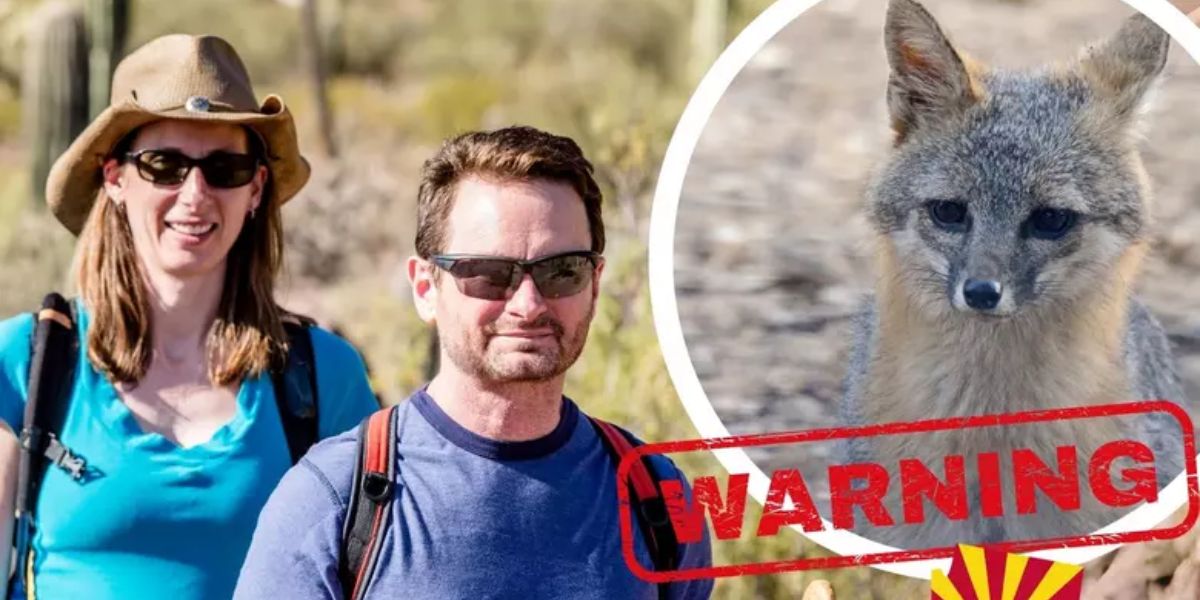“RABIES ALERT”: Foxes Attack Museum Worker in Tucson Tests Positive for Rabies! How Safe Are Arizona’s Neighborhoods?
The Arizona Department of Game and Fish said that two foxes tested positive for rabies after attacking a Tucson museum worker on Wednesday. On Wednesday morning, foxes attacked a worker at the Arizona-Sonora Desert Museum, but he was unharmed. After a brief search, Game and Fish employees identified and euthanized the two foxes suspected of being rabid.
Officials announced that both foxes tested positive for rabies.
The Arizona-Sonora Desert Museum did not immediately answer inquiries about whether the employee’s status changed following the positive test results. The Arizona-Sonora Desert Museum stated that the facility took precautions and treated the employees as if the foxes were dangerous to be around.
While the museum grounds were deemed safe enough to reopen on Friday, Game and Fish advised homeowners in the neighborhood to leave immediately if they saw ill or violent wildlife and report the sighting to 623-236-7201.
According to Game and Fish, everyone who is assaulted by a wild animal should be vaccinated against rabies.
Are Rabies Incidents on the Rise in Arizona?
According to data from the Arizona Department of Health Services, with two new verified instances in 2024, the state currently has 24 total wild animals that have tested positive for rabies. Of the confirmed rabies cases, 13 were foxes, with four in Tucson’s Pima County, one each in Greenlee and Pinal Counties, and seven in Navajo County.
According to the data, the total number of people exposed to rabies as a result of the museum assault has risen to eight statewide by 2024. Anne Justice-Allen, Game and Fish’s wildlife veterinarian said rabies cases in the state were not generally higher than average this year, but there had been an overall trend of more rabies cases in the previous two years.
According to Justice-Allen data, 49 animals tested positive for rabies in 2022, with 59 cases reported in 2023.
The specialist vet also stated that foxes and skunks were prevalent following heavy winter and summer rain across the state, creating an ideal setting for these creatures — as well as rabies — to thrive in the wild.
What Animal Attacks Linked to Rabies Occurred in 2024?
The current incident adds to a total of three fox attacks in Tucson in 2024. The latest incident at the Arizona-Sonora Desert Museum marks the sixth time a fox has attacked a person in the Tucson area, with the majority of the cases being tied to what is thought to be a rabid fox.
On April 4, a now-euthanized fox attacked three individuals near the Hugh Norris Trail in Saguaro National Park, requiring rabies treatment for all of them. On March 28, a gray fox was apprehended and euthanized after attacking a person in Tucson.

In December 2023, a suspected rabid gray fox viciously attacked two people near the Molino Base Campground in southern Arizona.
How Can You Keep Yourself Safe From Rabies?
The Arizona Department of Health Services stated that rabies is a serious virus disease that can be fatal if not treated and that anyone who has been exposed to it or attacked by a wild animal should seek medical attention. Rabies is a virus that causes central nervous system damage when infected animals bite you or if you come into touch with contaminated saliva.
The Health Department advised Arizonans not to touch or feed wild or unfamiliar animals, stressing that rabies can infect domestic animals such as cats and dogs, which frequently come into contact with diseased wildlife.
The Health Department also stated that rabies was common among foxes, which were found in all but one Arizona county, Mohave, and that the variant of the virus is frequently transmitted to other desert dwellers such as coyotes, bobcats, and javelina. People should take extra efforts to safeguard their dogs and children and seek immediate medical or veterinary care.
The Health Department Issued the Following Tips:
-
- Keep humans and pets safe from wild animals.
- Never leave pet food in your yard since it will attract wildlife.
- Do not pick up, touch, or feed wild or unfamiliar animals, particularly ill or injured ones.
- If you have been bitten, scratched, or come into touch with an animal, thoroughly
- clean the wound or area with soap and water and immediately notify animal control or health officials.
- Don’t “rescue” abandoned juvenile wild animals.
- Vaccinate all dogs and cats for rabies.
- Take precautions while camping, hunting, or fishing. Sleeping on the open ground
- without a tent or camper is not recommended.
- Keep your pets on a leash or in a fenced yard.
- When skinning carcasses, wear impermeable gloves.
- Please do not disturb roosting bats.
- If you find a bat on the ground, do not touch it. Place a box over the bat to keep it contained. Try to preserve the bat so that it can be tested in a laboratory. Report the bat and its location to animal control or public health officials.
- Teach kids not to handle or touch sick or injured animals, including bats.
- Report any animal bites to animal control or health personnel.











